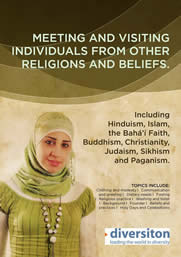Worship
Congregational worship at the sikh place of worship(Gurudwara)is called diwaan and its purpose is to praise God and develop the spiritiuality of the individual and community.
There are no ordained holy days in Sikhism. In Sikhism each moment is considered holy and living itself considered an act of devotion. Most Sikh families tend to visit a Gurdwara on a Sunday. A Sikh should visit the Gurdwara as often as possible to receive teachings from Guru Granth Sahib and seek the company of the holy congregation (Saadh Sangat) for spiritual guidance and upliftment through meditation (Naam Simran), prayer (Paat), singing of hymns (Keertan) from Guru Granth Sahib and rendering selfless service (Seva).
Sikhs are expected to become and remain God-conscious with every breath. Their prayers exhort the need for self-exploration, self-knowledge and self-realisation, and the running of their daily lives in accordance with the Guru’s Word (Gurmatt). Sikhs pray daily at three times. Before sunrise (Nitnem), evening (Raihraas) and before going to sleep (Sohelaa). However, Sikhs can additionally pray and meditate as much as they like when and where it practically suits them. Sikhs do not pray in any particular direction, believing God resides everywhere in His Creation. At the Gurdwara everyone sits on the floor to show equality of all people; this included Prince Charles when he visited a Gurdwara in Derby.
Public worship can be lead by any competent member of the Sikh community and therefore the notion of priesthood is alien to Sikhs. Women participate fully in all aspects. People appointed to special positions do not have a job for life. When their particular duty is over they revert to being members of the community.
![]()
The Gurdwara is open to all people. To enter, all devotees and visitors must remove their shoes and cover their head and dress modestly. Tobacco, alcohol and other intoxicants must not be taken inside. Many established Gurdwaras open before dawn and function without a break until 9.00 or 10.00 p.m. Where there is a smaller Sikh community suitable opening times are arranged. When a Sikh enters the main hall of the Gurdwara they bow or prostrate themselves in front of Guru Granth Sahib (which is installed on a raised platform with a canopy above it) as a mark of respect to the Guru’s teachings, and make some sort of offering (this could be food or money). Generally speaking men and women sit separately to avoid physical contact.
Throughout the day religious services are organised including congregational prayers, hymns singing (Keertan), meditation on God’s Name (Naam Simran) and sermons (Katha). The final service ends with prayers and the invocation to God (Ardaas), which prays for the universal blessing and well being of all mankind. After the service, all are requested to sit together and eat a vegetarian meal (Langar) prepared by volunteers (Sevadars). This meal is of great significance because it symbolizes the importance of equality and service to the community.


